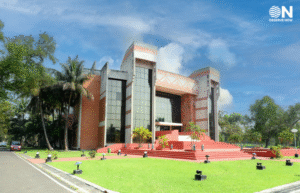ObserveNow Media successfully hosted the 3rd edition of the Super40 Digital Native Summit & Awards in Gurugram on 18th October 2024, themed “AI-Powered Transformation: The Digital Native Imperative.”
This mega summit brought together leading technology visionaries, industry pioneers, and innovative startups to delve into the transformative potential of AI and digital innovation. Designed to inspire change, the summit offered a day of insightful discussions, exceptional showcases, and never like before networking opportunities.
The summit featured over five sessions, more than 10 industry presentations, 40+ speakers, and attracted over 150 digital native leaders, highlighting its significant impact on shaping the industry’s future. Key partners included Niveus Solutions and Google Cloud as presenting partners, IBM as co-presenting partner, Fortinet and Ingram as cybersecurity partners, Spectra as an associate partner, and Pleasin Strides as the CSR partner.
Taniya Tikoo, Co-founder & Editor in chief, ObserveNow Media opened the stage for the by giving the welcome address by delving into the revolutions reshaping the digital native industry. Taniya stated “The world we are living in is now dominated by AI, which plays a significant role in Digital Transformation. India leads the digital payment space, but we must also focus on the ethical use of AI.”
The first panel discussion was held on “Generative AI: Revolutionising User Experiences” which was expertly moderated by Sunny Kapoor, Director -Technology Consulting, Ernst & Young LLP. Sunny set the tone of the panel by highlighting “”Innovation in generative AI has taken a fast pace in 2024. Organizations are progressing from demonstrations to rolling out POCs for solving real-life problems. Generative AI will have a significant impact on customer experience.” Rohit Sood, Advisory Data & AI Specialist, Technology, India and South Asia, IBM said “We’ve done 1000+ pilots across the globe, 70 of them in India. Out of those, 25 moved into production. Three key areas of learning emerged: multi-model AI (since a single foundation model can’t solve every problem), hybrid capability (including data security and deploying models behind firewalls), and the importance of responsible AI and ethics throughout the AI lifecycle.” Karan Aggarwal, CTO, DeHaat underscored “The biggest challenge in rural geographies, often ignored in the Indian ecosystem, is localization. A lot of AI and ML models depend on a knowledge base. Before we build intelligence, we need to build the foundation of knowledge.” Shakti Goel, Chief Architect and Data Scientist, Yatra highlighted “The usage of information from travel websites has transformed significantly for the betterment of both user and the company.” Ankit Aggarwal, Founder & CEO, Unstop emphasised “Generative AI should change the educational experience right from the start. When students enter college with no clear direction, GenAI can, over time, help them discover their interests and guide them toward the right career paths.” Nitin Jain, Co-founder & CBO, OfBusiness asserted “In the B2B space, it’s much harder to engage customers than in B2C, where the customer base is vast. Relying solely on AI for this might not be the best approach. However, chatbots do connect clients directly to customers, reducing the need for a salesperson” and Vipin Jain, Group CTO, CollegeDekho said “Generative AI can revolutionise every aspect of the student journey. It can now converse almost like a human being, making interactions more personalised and impactful.”
“What’s ‘digital native’ today? There’s no such thing anymore—everything is digital. But we are all guilty of sharing unnecessary information on social media, which can cause serious damage” said Jaspreet Singh, Partner, Grant Thornton Bharat LLP who moderated the second panel on “The Future of Digital Transformation and Cybersecurity: Mastering Strategies for the Decade Ahead.”
Suhan Shetty, Enterprise Architect – Infrastructure Services, Niveus Solutions, one of the panelist highlighted that “Two decades ago, India was focused on acquiring hardware and software. Today, our Prime Minister talks about cybersecurity, which shows just how much progress we’ve made.” Abhas Agarwal, Field Sales Representative, Google Cloud underscored “Many in India are still not immune to cybercrimes. Education and self-responsibility are crucial to addressing this issue.” Mohit Srivastava, CISO, Perfios emphasised “Cyberfrauds have also led to financial frauds, which are now prevalent issues. They can cause significant brand image damage.” Kush Kaushik, Co-Founder, Scrut Automation underscored “As we move toward digitalization in every aspect, cybersecurity becomes critical—not just to protect a brand’s image but the entire ecosystem. It’s high time we implement AI regulations in India.” Sandip Chhettri, Chief Executive Officer, TradeIndia highlighted “Startups often don’t invest in cybersecurity until they face a threat. This ignorance can prove costly.” Shiva Nand Singh, Director of Engineering, Moglix noted that “Think twice before granting permissions to apps on your mobile device. And stop using the same password everywhere.”
An Exclusive panel was held on “AI-Powered Platforms: The New Frontier for Start-Ups” and was moderated by Saurabh Kochhar, Founder, Meddo Wellness. Sushan Rungta, Chief Technology Officer, Absolute pointed out that “We need to educate people about technologies and their potential misuse. AI does make mistakes, and there will be consequences. The problem is that we don’t know how to properly adopt technology, so we need policies and strategies for it.” Tushar Bhatnagar, Co-Founder & CTO, vidBoard.ai said “AI has been a game-changer in personalization, especially for startups. If you have the right customer data, AI can utilize it effectively. But messy data will lead to inaccurate results, so data quality is key.” Akshit Tyagi, Co-Founder, Expedify highlighted “To keep pace with AI, thorough research is essential. Always think from the consumer’s perspective—what value will AI bring? Implement AI only if it’s necessary for your customers, otherwise, it’s just burning money.” Praveen Gupta, Co-Founder and CTO, WiJungle underscored “Cyberthreats can lead to bankruptcy. With AI, SaaS has emerged as a solution. The government needs to focus on regulatory frameworks.”
Engaging panel on “The Power Shift: Women Steering India’s Leadership Revolution” was held and was moderated by Taniya Tikoo. Taniya initiated the conversation by highlighting “There’s still a lot that needs to be done for startups led by women. The data on women led startups in India is not very impressive.” Amrita Sirohia, Co-founder, IND Money stated “There’s a gap in financial literacy among women, but nowadays, men are also showing interest. Still, women need a greater push to close this gap.” Tripti Tiwari, Founder, CloudTrains said “Financial independence is incredibly important for women for the betterment of our society.” Jharna Saha, Co-founder, Enlog underscored “Women adopt technology faster, especially when running a business. It’s a breakthrough for them, and technology is a big part of that.” Dipali Mathur Dayal, Founder, Super Smelly emphasised “While there’s growing awareness about sustainability, India is still a price-sensitive market. For the younger generation, making sustainable choices is crucial.” Shruti Kharbanda, Founder, Invincible Robo League said “STEM remains a male-dominated industry, with a lack of female role models. This sets the wrong example for young women. We need to bring more women into the spotlight.”
Another engaging panel on “AI 2.0: Innovating Beyond the Hype with Robust Cybersecurity Solutions” was moderated by Ravi Mathur, Co-Founder & CTO, Insurance Samadhan. “AI is something everyone is talking about, and many are building with it. People are eager to learn more” said Ravi. Dhruv Anand, Enterprise Sales, Google Cloud said “In 2023, many POCs were conducted by industries, but now those POCs have turned into pilots. Generative AI is now intervening positively to structure data and provide actionable results.” Atul Dubey, Regional Sales Manager, Fortinet highlighted “AI is hot and hyped right now. It helps ensure that no threats are missed.” Sahil Singla, VP Engineering, Infoedge noted that “It’s important not to over-spam consumers. Relevant communication is essential.” Sanjeev Singh, Head of Tech & Data, GensolEV underscored “AI helps reduce turnaround time by analyzing data quickly, allowing us to focus on more critical tasks.” Praveer Kochhar, CPO & Co-founder, Kogo Tech Labs said “Life is easier with large intelligent models but more challenging with smaller, offline ones. Enterprises won’t use publicly available AI on the cloud due to security concerns.” Deepak Gupta, Senior Executive, Vice President, CARS24 emphasised that “AI’s vision should always be aligned with business goals. For our clients, we’ve enabled AI chatbots that understand customer needs and provide the best solutions.” Nikhil Kumar Pathak, Co-founder & CTO, Brevistay pointed “AI is not new, but generative AI is. While chatbots reduce customer workload, they only address general queries. AI can further track and learn from these queries to improve its effectiveness.”
The final panel discussion for the day was held on “D2C Innovations in Digital Retail: Leveraging AI to Transform Customer Experiences” and was swiftly moderated by Abhay Batra, Co-founder & CFO, Clovia.
Abhay initiated the conversation by stating that” Consumer behavior drives dynamic pricing, and that can only be achieved with real-time data.” Shivam Maheshwari, Co-Founder & CTO, Goals101 said “You can analyze data, correlate different sets, create targeted audiences, and offer hyper-personalized campaigns. AI simplifies this process by providing reports on consumer spending patterns.” Anirudh Bhardwaj, CTO, Recur Club highlighted “While ethics and AI are discussed globally, we are still in the learning phase. It’s crucial to protect users’ privacy.” Ripunjay Chachan, Co-Founder, Wellversed underscored “User behavior on apps helps brands make things easier for both consumers and companies. AI and real-time data make this process seamless.” Shalabh Agarwal, CTO, Credflow mentioned that “AI is about dealing with data now, but in the future, AI will define how we use data.” Alok Paul, COO & Co-Founder, Berrylush concluded stating” In business, there are two parts: demand and supply. We work democratically. For small designs, we use predictive analysis to scale inventory. From the demand side, we communicate directly with consumers.”
The grand summit wrapped up with an awards ceremony celebrating the incredible digital native leaders shaping the industry.
Here are the award recipients along with their respective categories:
- Deepanshu Manchanda, Co-Founder & CEO, Zappfresh – DSM Fresh Foods – D2C Founder of the Year
- Ahmed Aftab Naqvi, CEO & Co-Founder, Gozoop & Sparknext – Young Entrepreneur with Outstanding Vision
- Manish Lunia, Co-Founder, FlexiLoans – Transformative Co-founder Award
- Suveer Bajaj, Cofounder & CEO, FoxyMoron – Digital Native Leader of the Year
- Aseem Garg, CEO, DCDC Care – Changemakers in Social Entrepreneurship
- Kruti Bharucha, Founder and Chief Executive Officer, Peepul – Founder with Exceptional Leadership
- Dipali Mathur Dayal, Founder, Super Smelly – Women Founder with Exceptional Leadership
- Sachin Saxena, CTO, Heads Up for Tails – Digital Native Leader of the Year
- Paras Arora, Founder and Chief Executive Officer, Qdesq – Best B2B Startup
- Amit Bagga, CEO, Daryaganj Hospitality – Innovative CEO of the Year
- Shon Joseph, CTO, Loanframe – Best Technology Startup of the Year
- Abhay Batra, Founder & CEO, Clovia – D2C Founder of the Year
- Varun Verma, Co-Founder & CTO, Merapashu360 – D2C Brand with Best Social Impact
- Jainesh Sinha, Co-founder, Gyandhan – D2C Social Impact
- Anirudh Bhardwaj, CTO, Recur Club – Digital Native Leader of the Year
- Ramanpreet Singh, Senior Vice President, Flyremit – Innovator in Customer Experience
- Rampal Rao, Director of Engineering, Snapdeal – Visionary Leader in Digital Transformation
- Ayush Gupta, CTO, Enlog – Visionary Leader in Digital Transformation
- Akshay Kumar Sharma, Director-Technology, Medley India INC – Visionary Leader in Digital Transformation
- Shakti Goel, Chief Architect and Data Scientist, Yatra – Best Use of AI
- Abhit Sinha, Co-Founder, AI and Computer Vision – Head Technology, Orbo.ai – Visionary Leader in Digital Transformation
- Rithish Kumar, Co-Founder, Pee Safe – D2C Brand of the Year
- Ankit Aggarwal, Founder & CEO, Unstop – Best HR Tech Startup
- Sahil Singla, VP Engineering, Infoedge – Innovator in Customer Experience
- Saurabh Wadhwan, Co-Founder, Scalenut – Transformative Founder Award
- Deepak Gupta, Senior Executive, Vice President, CARS24 – Digital Native Leader of the Year
- Praveer Kochhar, CPO & Co-founder, Kogo AI – Innovative CEO of the Year
- Ripunjay Chachan, Co-Founder, Wellversed – D2C Brand of the Year
- Nikhil Kumar Pathak, CTO, Brevistay – Top Travel Startup
- Vipin Jain, Group CTO, CollegeDekho – Visionary Leader in Digital Transformation
- Mohit Srivastava, CISO, Perfios – Cybersecurity Leadership in Digital Transformation
- Sandip Chhettri, Chief Executive Officer, TradeIndia – Pioneering Leadership in B2B Digital Transformation
- Tushar Bhatnagar, Co-Founder & CTO, vidBoard.ai – Innovative CEO of the Year
- Akshit Tyagi, Co-founder, Expedify – Excellence in Digital Marketing Innovation
- Sanjeev Singh, Head of Tech & Data, GensolEV – Visionary Leader in GenAI
ObserveNow is gearing up for the 4th Edition of the Super 40 Digital Native Summit and Awards, set to take place in Bengaluru this December. Be part of this event and witness the transformative wave in action.
























